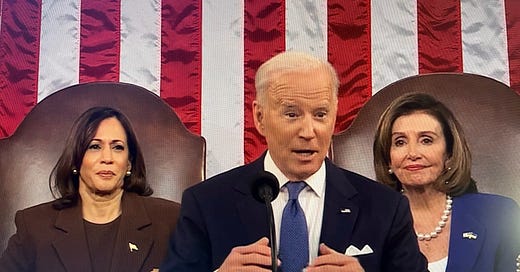Biden touts Build Back Better's proposed changes to Medicare and ACA in the State of the Union
Analysis on the 2022 State of the Union
Tonight’s State of the Union looked quite different from President Joseph Biden’s first address to Congress last year. At the forefront of everyone's minds was the Russian invasion into Ukraine. Mr. Biden spent the first twenty minutes or so of his speech defending Ukraine and praised his administration’s sanctions and other actions against Russia and Russian President Vladimir Putin. While there will be much ink spilled and analysis spoken on America’s support (or lack thereof) of Ukraine, FLATLINING will be focussing on what he discussed regarding healthcare.
Firstly, it was interesting to see the President enter the House of Representatives without a face mask. Today was the first day in the District of Columbia where masks were not required indoors. DC Mayor Muriel Bowser also rescinded the District’s order to require proof of vaccination against COVID-19 to dine in a restaurant last month. President Biden spoke on the COVID-19 pandemic and there is more on that below.
Within the first twenty minutes of his speech, Mr. Biden prided himself on the Build Back Better bill which he said would lower the costs of healthcare for many Americans. The Build Back Better bill would have expanded the Affordable Care Act, Medicare, Medicaid, and the Children’s Health Insurance Program and was passed by the House.
When the bill passed the House, the Kaiser Family Foundation (KFF) did an analysis of the Build Back Better bill and investigated what the actual costs would be based on their analysis and estimates from the Congressional Budget Office (CBO).
The KFF cites the CBO in saying that the expansions of the Affordable Care Act (ACA) would cost $79.3 billion over the next ten years. This includes direct spending and revenue shortfalls. At the same time, however, the CBO estimates that the expansion will reduce the number of uninsured Americans by about one million. KFF also estimates that roughly forty-six percent of non-elederly uninsured people in the US are eligible for healthcare with low or no deductibles through the ACA marketplace at HeathCare.gov.
Regarding the restructuring of Medicare Part D, the KFF estimates that it would increase federal spending by $57 billion in the next ten years. The CBO estimates that this would reduce the number of uninsured Americans by over one and a half million, mostly in North Carolina, Florida, Texas, and Georgia. This restructuring would allow residents in states that do not have expanded Medicaid (like those above) to purchase subsidized coverage from the ACA marketplace.
Mr. Biden also called for capping the cost of insulin at $35 a month in his speech. He also claimed that this would benefit the drug companies because they would still have very high profit margins.
While advocating for capping the cost of insulin, Mr. Biden also called for allowing Medicare to negotiate prices with the drug companies. After all, he said, “they already do that for [Veterans Affairs].” Pharmaceutical Research and Manufacturers of America (PhRMA), a lobbying group for the pharmaceutical industry, has previously opposed proposals for this idea. In September 2021, they said that “In countries where governments do set the price, patients often have delayed access, if access at all.” Typically, the argument by the drug companies is that decreased revenue will cause them to have less money in research and development. Advocates of the policy claim that it will lower drug prices for all Americans.
In other economic items, Mr. Biden announced that the Justice Department would be launching a chief prosecutor for “pandemic fraud.” He did not provide more details than that but he likely means that the federal government will prosecute businesses who applied and received Paycheck Protection Program money when they were not eligible for it.
Roughly an hour into his speech the President called to “end cancer as we know it.” He said it was personal for him and his wife; Mr. Biden’s son Beau died of brain cancer in 2015 at the age of forty-six. He called on Congress to fund the Advanced Research Projects Agency for Health with the hope of changing cancer from a death sentence to a disease with a cure.
Mr. Biden also said that the United States should not just accept living with COVID-19 but should continue to fight the virus. He advocated for vaccines and booster shots and urged parents to vaccinate as soon as vaccines are approved for children. He also claimed that the United States has sent over 400 million vaccines to other countries around the world, more than any other nation on the planet.
The president also touted developments in Pfizer’s COVID-19 anti-viral pill and expressed his idea to allow the pill to be available in pharmacies. This, he claimed, would allow those who test positive to receive treatment for the virus right in the store.
Mr. Biden campaigned on unity and he pleaded for it in his section on COVID-19. He said that the virus is a terrible thing that has happened to the country and that Americans shouldn’t look at others as enemies. He also added that his administration will be ready if a new variant comes.
Ultimately, the President claimed the state of the union was strong, “stronger today than we were a year ago,” he said.
With the surprising amount of time President Biden spent on healthcare it is clear that this will be a topic of conversation that will appear in the midterms this year. It will be interesting to see how congressional candidates approach the topic, particularly Republicans, as they seek to retake both the House and Senate in November.
Editors note: A previous version of this article said that Build Back Better had been signed into law. Build Back Better only passed the House of Representatives and this article has been corrected.





